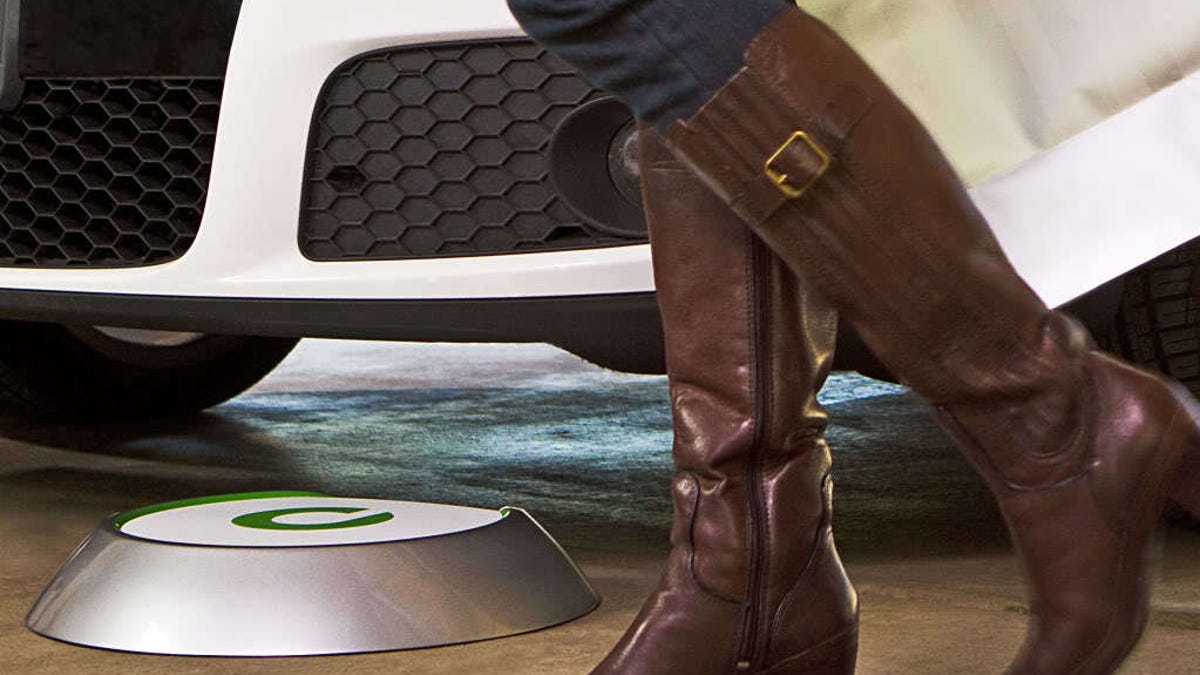Will wireless charging void your EV's warranty? (updated)
Wireless charging of your EV battery sounds like a great time saver, but that convenience could come at a high cost by voiding your car's warranty.

Hertz announced last week that it was testing a wireless charging station with Plugless Power on a
The test, conducted by Plugless Power manufacturer Evatran, will provide data on daily usage routines, user interfaces, and any additional functionality needed. But don't get too excited about trying out this new product. Although Hertz rents EVs and plug-in hybrids in New York, Washington, D.C., and San Francisco, the trial is being conducted on a single car at the company's New Jersey corporate headquarters. So unless you're doing business in Park Ridge, you won't get an opportunity to take the wirelessly charging Leaf out for a spin. And before you decide to replicate this experiment on your own EV, you'd better read the fine print.
Using Plugless Power requires a modification to your electric vehicle's battery system. A technician outfits an EV with a receiving coil that's identical to the transmitting coil in the parking pad installed on the ground and connected to the charging station. When the car is parked within range of the wireless charging pad, a magnetic field is created that allows electricity to transfer between the charging pad and the car's battery. Each electric vehicle needs a specific adapter, and so far Evantran has created adaptors for the Nissan Leaf and the
However, that simple modification could end up voiding your electric car's warranty.
"Installation of an inductive charging system would likely void the charging system warranty and possibly the battery warranty as well," wrote GM spokesperson Rob Peterson about the Chevy Volt's compatibility with Plugless Power in an e-mail. The Volt is an extended range electric vehicle that uses an 240-volt charger to connect the vehicle to a charging station and has not been approved for use with a wireless charging system.
And Plugless Power has not been approved for use with the Nissan Leaf. Nissan requires any electric vehicle supplier to obtain UL certification first, and then complete compatibility testing with the Leaf at their engineering facility in Michigan. Questions in an e-mail about Plugless Power's compatibility testing status were not answered by Nissan, and calls to Evatran were not immediately returned.
However, Nissan plans to release a wireless charging station that is rumored to be available in 2013.
Update: Evatran Chief Operating Officer Rebecca Hough responded in an email:
The Magnuson-Moss Warranty Act is a longstanding act (1975) and reviews the ability for OEMs to "refuse" non-OEM manufactured parts. Questions regarding OEM's voiding of vehicle warranty with non-OEM parts is a question that's been around for quite some time. SEMA is constantly lobbying and protecting this law. The law is pretty clear in terms of aftermarket installations: OEMs can not outright void a vehicle warranty simply due to the addition of aftermarket parts. With that said, if the addition of an aftermarket system is proven to cause a failure to the vehicle - they can refuse warranty service to the customer. The onus on proving this failure is on the manufacturer (OEM). We have studied our system installation on vehicles and in our aftermarket product line, the vehicle registers no difference between the traditional wired system and the wireless interface. We have a warranty policy that would protect our customer if there was any problem with our system and it was proven to cause any issue to existing vehicle components. In this event, we would cover both the replacement of damaged vehicle components and our system. Our system is identical to any other aftermarket product in this analysis.
In a follow-up call, Hough also stated that the company is pursuing factory installation of its system with manufacturers.

